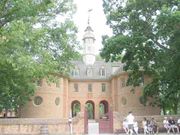1705
| Millennium: | 2nd millennium |
|---|---|
| Centuries: | 17th century – 18th century – 19th century |
| Decades: | 1670s 1680s 1690s – 1700s – 1710s 1720s 1730s |
| Years: | 1702 1703 1704 – 1705 – 1706 1707 1708 |
| 1705 in topic: |
| Subjects: Archaeology – Architecture – |
| Art – Literature (Poetry) – Music – Science |
| Countries: |
| Leaders: State leaders – Colonial governors |
| Category: Establishments – Disestablishments |
| Births – Deaths – Works |
Year 1705 (MDCCV) was a common year starting on Thursday (link will display the full calendar) of the Gregorian calendar (or a common year starting on Sunday of the 11-day slower Julian calendar). Year 1705 of the Swedish calendar was a common year starting on Sunday, one day ahead of the Julian calendar.
Contents |
Events of 1705
January–June
- 8 March – The Province of Carolina incorporates the town of Bath, making it the first incorporated town in present day North Carolina. The town becomes the political center and de facto capital of the northern portion of the Province of Carolina until Edenton is incorporated in 1722.
- 5 May – Joseph I, Holy Roman Emperor succeeds his father Leopold I.
July–December

November: Williamsburg Capitol (replica).
| Gregorian calendar | 1705 MDCCV |
| Ab urbe condita | 2458 |
| Armenian calendar | 1154 ԹՎ ՌՃԾԴ |
| Bahá'í calendar | -139 – -138 |
| Bengali calendar | 1112 |
| Berber calendar | 2655 |
| Buddhist calendar | 2249 |
| Burmese calendar | 1067 |
| Byzantine calendar | 7213 – 7214 |
| Chinese calendar | 甲申年十二月初六日 (4341/4401-12-6) — to —
乙酉年十一月十六日(4342/4402-11-16) |
| Coptic calendar | 1421 – 1422 |
| Ethiopian calendar | 1697 – 1698 |
| Hebrew calendar | 5465 – 5466 |
| Hindu calendars | |
| - Bikram Samwat | 1761 – 1762 |
| - Shaka Samvat | 1627 – 1628 |
| - Kali Yuga | 4806 – 4807 |
| Holocene calendar | 11705 |
| Iranian calendar | 1083 – 1084 |
| Islamic calendar | 1116 – 1117 |
| Japanese calendar | Hōei 2 (宝永2年) |
| Korean calendar | 4038 |
| Thai solar calendar | 2248 |
- November – In Williamsburg, capital of the Virginia colony in America, construction of the Capitol building is completed.
- December – The Sophia Naturalization Act 1705 is passed by the British Parliament, which naturalizes Sophia of Hanover and the "issue of her body" as British subjects.
- 25 December – In Munich, capital of Bavaria, 1100 militiamen from the Oberland are killed during the Sendlinger Mordweihnacht, after a failed attempt to break through several gates and capture a depot to seize better weaponry; many men were slaughtered by German federal infantry and Hungarian Husars, despite their capitulation to Austrian officers.
Undated
- The "atmospheric" steam engine was designed by the English inventor Thomas Newcomen.
- Construction begins on Blenheim Palace, in Oxfordshire, England. It is completed in 1724.
- Taichung City, Taiwan is founded as the village of Dadun.
- With the interest paid from daimyo loans, the Konoike buy a tract of ponds and swampland, turn the land into rice paddies and settle 480 households numbering perhaps 2,880 peasants on the land.
- The Shogunate confiscates the property of a merchant in Osaka "for conduct unbecoming a member of the commercial class". The government seizes 50 pairs of gold screens, 360 carpets, several mansions, 48 granaries and warehouses scattered around the country and hundreds of thoudands of gold pieces.
Ongoing events
Births
- January 14 – Jean-Baptiste Charles Bouvet de Lozier, French governor of the Mascarene Islands (d. 1786)
- January 24 – Farinelli, Italian castrato (d. 1782)
- February 15 – Charles-André van Loo, French painter (d. 1765)
- February 21 – Edward Hawke, 1st Baron Hawke, British naval officer (d. 1781)
- February 22 – Peter Artedi, Swedish naturalist (d. 1735)
- March 2 – William Murray, 1st Earl of Mansfield, Scottish judge and politician (d. 1793)
- April 11 – William Cookworthy, English chemist (d. 1780)
- July 23 – Francis Blomefield, English topographer (d. 1752)
- August 30 – David Hartley, English philosopher (d. 1757)
- September – Dick Turpin, English highwayman (d. 1739)
- September 24 – Leopold Josef Graf Daun, Austrian field marshal (d. 1766)
- September 28 – Henry Fox, 1st Baron Holland, English statesman (d. 1774)
- October 23 – Maximilian Ulysses Count Browne, Austrian field marshal (d. 1757)
- October 31 – Pope Clement XIV (d. 1774)
- November 23 – Thomas Birch, British historian (d. 1766)
Deaths
- January 12 – Luca Giordano, Italian artist (b. 1634)
- January 17 – John Ray, English naturalist (b. 1627)
- February 5 – Philipp Jakob Spener, German theologian (b. 1653)
- May 5 – Leopold I, Holy Roman Emperor (b. 1640)
- July 12 (or 13) – Titus Oates, English conspirator (b. 1648)
- August 16 – Jacob Bernoulli, Swiss mathematician (b. 1654)
- October 11 – Guillaume Amontons, French physicist and instrument maker (b. 1663)
- November 30 – Catherine of Braganza, queen of Charles II of England (b. 1638)